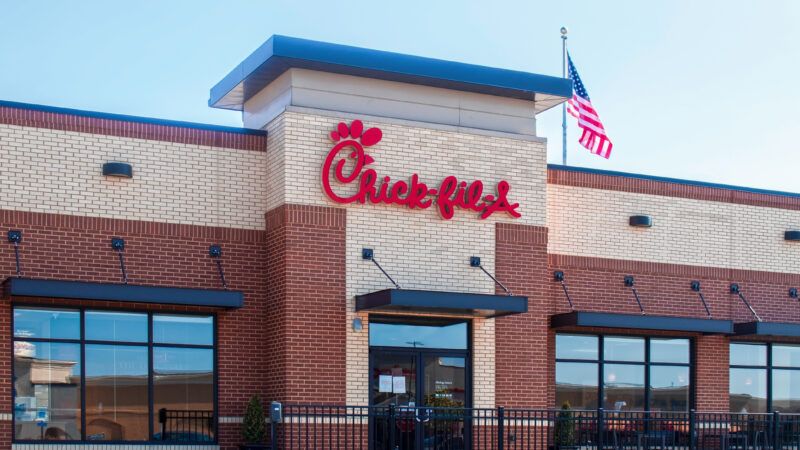New York Times Staffers Bullied a Conservative Writer
The Chick-fil-A story heard 'round the world.

Adam Rubenstein is a journalist and former opinion editor at The New York Times. As a person of right-leaning political sensibilities—Rubenstein previously worked for The Wall Street Journal and The Weekly Standard—he was brought to the Times opinion pages with a mandate to help diversify its ideological offerings. His bosses said they expected him to use his contacts in conservative media to solicit, research, and improve op-eds that would advance contrarian arguments and challenge the paper's editorial point of view, as well as its readers.
This mandate resulted in the now-infamous publication of an editorial by Sen. Tom Cotton (R–Ark.) on June 3, 2020—amid the nationwide protests following the death of George Floyd—headlined "Send In the Troops." In the op-ed, Cotton called for the federal government to deploy the military to end the rioting and looting in U.S. cities.
While one can raise a number of practical, philosophical, and even legal objections to such a proposal, it was not exactly a controversial suggestion, at least as far as public opinion was concerned: Polls showed that more than half of American voters wanted the feds to mount a more aggressive response to all the lawbreaking. But among The New York Times' staff, the op-ed proved to be radioactive. Times journalists went ballistic, publicly attacking their organization for daring to run such a piece. A characteristic response came from the Times' Nikole Hannah-Jones, the 1619 Project originator, who wrote on Twitter, "As a black woman, as a journalist, as an American, I am deeply ashamed that we ran this."
There's nothing inherently wrong with opinion journalists criticizing the thoughts of a U.S. senator, of course, but many on staff did not stop there. On the contrary, they argued the Times never should have published the op-ed—that platforming such an opinion was an act of violence against black people and would cause them harm. These staff members became organized, and soon enough, many of them started tweeting nearly identical statements that the op-ed had put black writers in danger. Eventually, more than a thousand Times employees signed a letter to top NYT bosses accusing them of jeopardizing "our reporters' ability to work safely and effectively."
With hindsight, it's very clear what they were doing: appropriating the language of human resources—hostile environment, workplace safety, etc.—for the ideological project of shutting down an opinion that clashed with theirs. And the gambit worked. In an attempt to mollify the staffers, the Times published a groveling apology in the form of a self-flagellating editor's note that is still appended to the op-ed to this day. A.G. Sulzberger, the publisher of the Times, forced James Bennet, the editor of the opinion pages, to resign, and he did so. Other personnel involved with the Cotton op-ed were reassigned, and Rubenstein left the paper some months later.
This sorry episode is currently being re-litigated, four years later, in light of a revelatory article published in The Atlantic earlier this week. Rubenstein is finally telling his side of the story, and he has persuasively argued that the Times threw him, Bennet, and Cotton under the bus to appease a woke mob. He debunked several criticisms of the op-ed—namely, that it had included obvious factual errors—and pointed out that Times op-eds penned by literal authoritarian dictators such as Moammar Gadhafi, Recep Tayyip Erdogan, and Vladimir Putin had not produced any internal fury whatsoever. It's very telling whose words are described as literal violence, and whose are not.
"Last year, the page published an essay by the Hamas-appointed mayor of Gaza City, and few seemed to mind," wrote Rubenstein in The Atlantic. "But whether the paper is willing to publish conservative views on divisive political issues, such as abortion rights and the Second Amendment, remains an open question."
His article certainly appears to confirm suspicions that the paper of record is, at least at times, in thrall to its liberal staffers.
Since the publication of Rubenstein's record-straightening account, an interesting criticism of it has appeared on social media. This criticism takes aim at a fascinating anecdote related by Rubenstein in the article's opening paragraphs.
According to Rubenstein, he participated in an orientation activity upon first joining the Times: An HR representative asked new employees to each answer a question about themselves. Rubenstein was told to describe his favorite sandwich, and volunteered the spicy chicken from Chick-fil-A. The HR person chided him for citing Chick-fil-A, a fast food chain with a socially conservative founder. "We don't do that here, they hate gay people," was the response—a self-parody of woke shibboleths, if ever there was one.
In fact, this response by a Times HR figure is so embarrassing that some liberals have decided it simply cannot be true. Enter Hannah-Jones, who opined on X (formerly Twitter) that the anecdote in question "never happened." She was hardly alone in accusing Rubenstein of making it up; writer Michael Hobbes said the anecdote was "egregiously fake."
Never mind that over the years, Rubenstein has told a number of other journalists—including yours truly—about the incident. The Atlantic actually verified it. The writer Jesse Singal reached out to the publication, and Atlantic editors said that Times employees with "contemporaneous knowledge" of the orientation session confirmed it happened.
Atlantic spokeswoman on the Chick-fil-A incident that Nikole Hannah-Jones and many others claimed must have been fabcricated: "the details were confirmed by New York Times employees who had contemporaneous knowledge of the incident in question." pic.twitter.com/KL0cptFB6B
— Jesse Singal (@jessesingal) February 27, 2024
So the next time conservative, libertarian, or independent thinkers are accused of spreading misinformation or reflexively distrusting the media, it might be helpful to remind the accusers in the mainstream press that we're all in good company.


Show Comments (79)